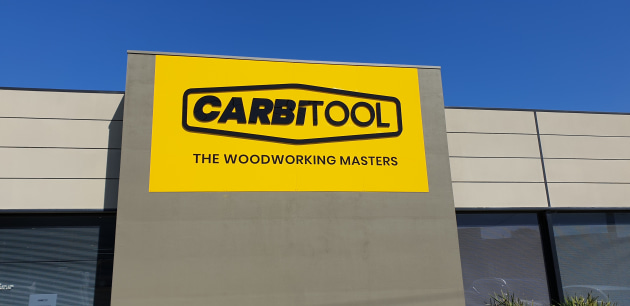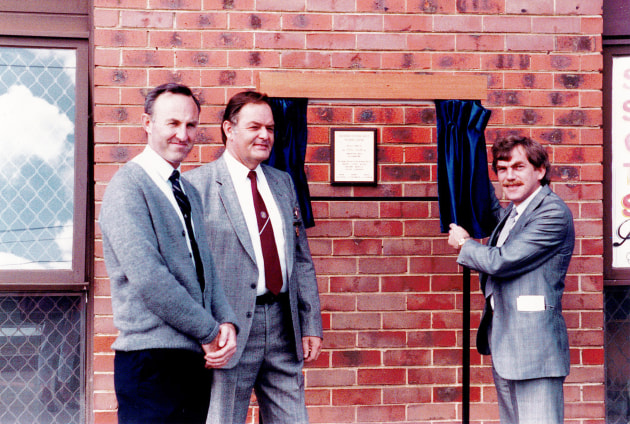Australian made: the Carbitool story
This year we’re proud to announce our major sponsor for Maker of the Year Awards is Carbitool, an Australian manufacturer of precision tooling and accessories based in Melbourne.
Carbitool is a family company founded in 1973 by Neil Hamilton OAM – in the family home, no less. Almost 50 years later with an expanded range, the company continues its family tradition in a factory setting with state-of-the-art technology.
Mark Hamilton (shown above) is Carbitool Sales Manager. We asked him about the early days and how the company developed.
Mark, can you please tell us what the manufacturing scene in Australia was like in the 70s?
In the 1970s there was a very active and buoyant manufacturing sector servicing many segments of the market. Many cabinet hardware products and various forms of tooling were locally produced.
Choose any product at random, from showerheads to flywire screens, and chances are it would be locally manufactured. Apart from electronics, ‘most’ things seemed to be Australian made. Automotive production was in full swing, with Ford, GM and Chrysler all manufacturing locally, and components to supply them were produced by literally hundreds of small to medium sized engineering companies.
1. Steve Crabb, Minister for Employment and Industrial Affairs (right), with Mal Foster (left) and Neil Hamilton (centre) at the opening of the Southern Suburbs Group Training Scheme.
How did the Carbitool company to start? How quickly did it grow?
Like many companies, Carbitool began as a family business. Prior to establishing a manufacturing site, its origins were in the family home. Initially an order of premium quality TCT circular saw blades were imported from Gomex who had plants in both the UK and Kalmar, Sweden. These arrived in crates and were ‘warehoused’ in the lounge room of the family home.
With most of the sawblades sold, the capital was raised to seek out a suitable factory. ‘44A Argus Street, Cheltenham’ was the first official business address of (then-called) Carb-I-Tool (Aust) Pty Ltd. After several years the operation outgrew these premises and Carbitool moved to a larger factory at 88 Cochranes Road, Moorabbin.

2. After another move, the then-named Carb-I-Tool factory at 76 Levanswell Rd, Moorabin in 1999.
Some years later another move to 76 Levanswell Road, Moorabbin accommodated further expansion. A manufacturing division was then established in separate premises directly across the road. Eventually 12 Levanswell Road was purchased to house a further expanded manufacturing division and after a few years Sales and Administration was consolidated there, and this is where Carbitool continues to operate today.
In what other ways did the company grow?
Over the years Carbitool acquired a number of businesses for strategic purposes and to enable expanded capability and capacity. Amongst these were E&F Stanley, an intergenerational company founded in 1946 just after the second world war, All Cut Tools in Sydney, C & S Saw Service and Meyer Precision Grinding.

3. On the factory floor in 1999, showing operators at tool and cutter grinders alongside Carbitool’s first generation 4-Axis ANCA Fastgrind machines.
What were the aims of the company at that stage?
Initially, the aims of Carbitool were to produce and supply tungsten carbide tipped router bits and cutting tools to the local market. Most router bits were imported from England and in particular from the US, and the majority were manufactured using high speed steel. HSS proved inadequate for the rigorous demands of Australian hardwoods however. Tooling required a harder, more durable cutting edge for Australian operating conditions, so tungsten carbide tipped or solid carbide became the material of choice. Hence the name Carbitool refers to Carbide.
What were the first Carbitool items produced? How did the range grow?
The first items produced were carbide tipped router bits. Carbitool imported some high speed steel router bits from Tarpley in the US and in return, Tarpley bought carbide tipped router bits from Carbitool for distribution in the US market.

4. This early and well used model Makino tool and cutter grinder was a highly effective workhorse that gave superb results.
How has the technology changed over the years? How did manufacturing processes differ.
Prior to the development and introduction of CNC machining centres, router bits, whether TCT or solid carbide were manually ground on tool and cutter grinders. Carbide tipped cutters required a particularly lengthy manufacturing process beginning on a metal lathe with turning the shape of the cutting head and shank onto the steel bodies.
From the lathe, bodies are moved to a milling machine where the flutes are milled into the cutting heads. After milling the bodies go to brazing where carbide tips are brazed or bronze welded onto the steel bodies. From the brazing station the now tipped bodies are moved to the paint division where they are either dipped in equipment enamel or powder coated. From painting they’re off to a tool and cutter grinder where an operator grinds the carbide tips using specialised industrial diamond grinding wheels.

5. Brazing cutter tips – hands-on work was the hallmark of early production.
Cutters are then taken to a centreless grinder where shanks are cylindrically ground. Router bits which have a bearing guide require spigot turning. The shank is inserted into the collet of a turret lathe and the bearing spigot is turned. This is done as the last operation ensuring bearing seats are concentric regardless of any movement caused by the heat of brazing.
Past investment in highly specialised Swiss EWAG grinding machines assisted with solid carbide grinding. Nowadays virtually all solid carbide cutters are manufactured on our state of the art, Australian made ANCA 7-axis CNC machining centres. These machines incorporate a robotic arm which automatically loads an unmachined cylinder of carbide from a pallet into the machine chuck, removes it when the grinding cycle is completed and places it into another pallet then repeats the cycle.

6. Back in the day: family members Cary Hamilton (left), still with the company today; and on the right Stephen Hamilton, now retired.
How many people work in the Carbitool factory?
We currently have five permanent full time operators on the workshop floor. One has 30 years of service to his name, another has almost 40 years with a third having almost 45.

7. Team member Ross Storay adjusts settings on Carbitool’s first generation NC lathe. Ross began working at Carbitool January 26, 1977 as an apprentice and is still on the shop floor today.
Does Carbitool export its products?
Overseas customers often look to different suppliers to take advantage of fluctuating currencies. Even against this challenge, Carbitool manufactured items have been exported to many countries including New Zealand, many Polynesian nations, New Guinea, the UK and US, South America, Dominican Republic, South Africa, Mauritius, The Middle East, Japan and several South East Asian counties including Singapore, Malaysia, Philippines, Indonesia, Sri Lanka and even China.

8. Carbitool stand mid-90s at an early Timber & Working With Wood Show. Shown centre: Debbie Butler (née Hamilton) and Mark Hamilton (in the white shirt).
The Carbitool range includes sawblades and accessories. Are these made in-house or elsewhere?
Carbitool has offered premium quality sawblades since its inception in 1973. Carbitool continue to offer a mix of Australian-made and imported sawblades for cutting timber and board product, laminates, aluminium, steel, fibre cement sheet and composite materials.
How have things changed since Carbitool was acquired by Sutton Tools in 2018? Do the two companies work together (if at all)?
Carbitool operations have been incrementally merged into the Sutton Tools business with Carbitool operating on the same Enterprise Resource Planning software, Customer Relationship Management software etc. The Sutton Tools regrind centre or sharpening service is now located at the Carbitool site at Moorabbin and several processing/packaging operations for Sutton Tools product are now also performed out of Moorabbin. There is a high level of engagement between sales/customer service/accounts staff at the Sutton Tools Thomastown site and the Carbitool Moorabbin site.

9. ‘Mega cabinet’ display of around 320 router bits, early 90s, 76 Levanswell Rd premises. The company logo has changed, however the range, albeit extended, is current.
What are the main challenges that Australian manufacturers face nowadays?
While sourcing raw materials and manufactured product can be problematic due to supply chain issues, the largest ongoing hurdle remains competing with foreign labour rates which can be a fraction of Australian labour costs. Many Australian-based manufacturing industries face this issue and in some cases Australian labour costs prove too prohibitive to continue with local manufacturing. CNC machining centres reduce manual labour input and investment in automated processing such as CNC are often the answer to allow continued local manufacturing.

10. On the factory floor today, virtually all solid carbide cutters are now manufactured on state of the art, Australian-made ANCA 7 axis CNC machining centres.
What are the aims of the company today? How do they differ from the initial ones?
The initial aim was to establish a company specialising in the manufacture of high quality Australian made cutting tools to supply and service a growing local market. The aims of the company today are to continue offering a premium quality product with a high level of service to a well established market.
Any hints at what future developments for Carbitool might be?
Future developments for Carbitool include an expanded product range which remains focused on the wood machining market, maintaining an excellent level of customer service and continued operational and systems integration into the wider Sutton Tools business.
Learn more about Carbitool at www.carbitool.com.au
Learn more about Maker of the Year Awards, presented by Carbitool at www.woodreview.com.au/moty2023




